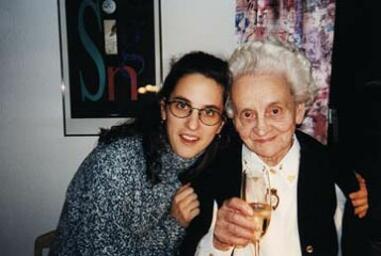|
The future lies less in the power of private ownership than in the wisdom of leasing product and services. Its not such a perverse observation to note that ten years after the internal collapse of the Soviet Union and the image of Socialism with it, property is more socialised now than at any time since the industrial revolution. How so? When a consumer product is shared, or rented or on hire-purchase, its something owned by one person and used by several others. Isn't the term `private socialisation' appropriate, I think so. The rational logic of many people using and not owning is something fought against by advertising, a fight that has to be lost eventually. Business hates a loser. The time is right for even big business to promote and supply goods for multiple use by non-owners. Socialism by stealth. Other Perspectives "I think we're standing on the threshold of a very profound change in our economy," says Hunter Lovins, chief strategist at the Rocky Mountain Institute forward-thinking alternative economic "think tank." She and colleagues, who write extensively about sustainable economies, envision a day when consumers will lease everything from air conditioners to carpet to transportation. Lovins says more and more manufacturers are interested in leasing their products to consumers rather than selling them outright. Not only do so-called "lease options" give manufacturers a competitive edge in a market that's tight on materials, the options are also good for the environment, she says. "A lot of this is simply good housekeeping," says Lovins. By maintaining tighter control over products and the raw materials used to make them, manufacturers get more from their initial capital investment. And since a single investment can mean multiple leases to multiple customers, she maintains, it behooves the manufacturer to extend the life of the product ‹ or parts of the product ‹ as many times as possible. Consider Eastman Kodak's successful "single-use" camera. After the consumer hands over the camera to a photo finisher, the paper-and-plastic box is shipped to Kodak, where it is stripped, cleaned, fitted with a new lens, and rehoused with paper. Once reloaded with film, the camera is ready for a new lease on life. The loop is closed: The camera is spared a trip to the landfill. "When we reuse our products ‹ much less recycle them ‹ we keep our costs down significantly," says Rob Fischmann, head of worldwide recycling at Kodak. "The second-time cost for these cameras is essentially zero." Kodak currently recycles 77 percent to 86 percent of the material used to make these little cameras. And single-use cameras that makes it back to the factory will be refurbished and resold as many as 10 times. In fact, the not-so-disposable scheme is so profitable for the company, says Fischmann, that Kodak managers now hope to use the lease-option model elsewhere in their business. "It's really starting to take off here," he says. If leasing is so good for the consumer, the manufacturer, and the environment, why aren't we leasing more today? For starters, says Lovins, most us live in an ownership-oriented society. Businesses can't shake the notion of owning their assets. Likewise, accountants don't yet know how to enter these lease options in their ledgers. Consumers also have a difficult time buying into the idea. "Ownership is still a status symbol in most parts of the world," says Lovins. But in the decades ahead, consumers and manufacturers will close the loop on products and services together, she wagers. And business may lead the way. "It's easy for the consumer to get sentimental about owning an automobile or a camera," she says. "It's much harder for business to get sentimental about owning an industrial carpet." Lets `share' a toast to the another recycled millenia.
|

